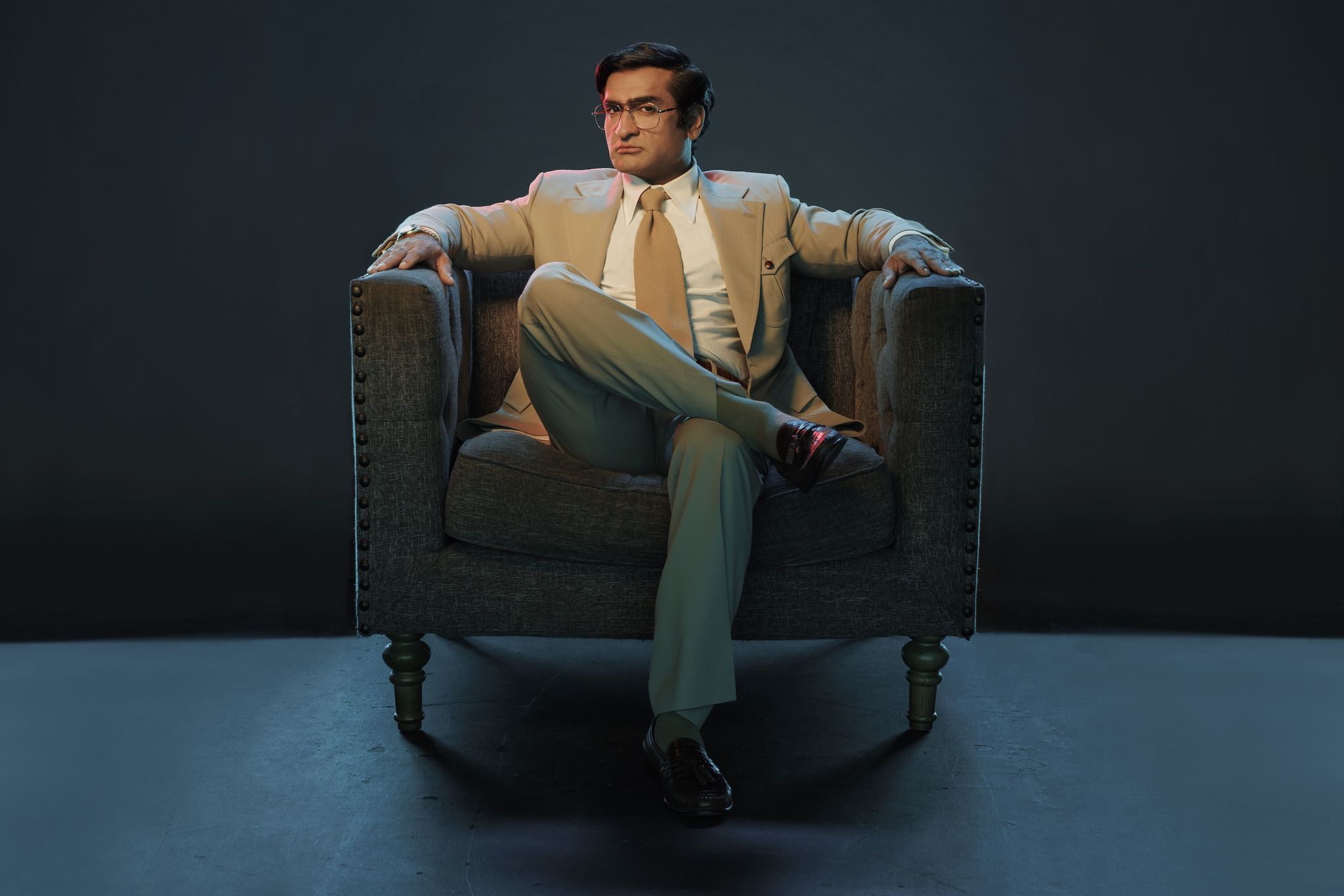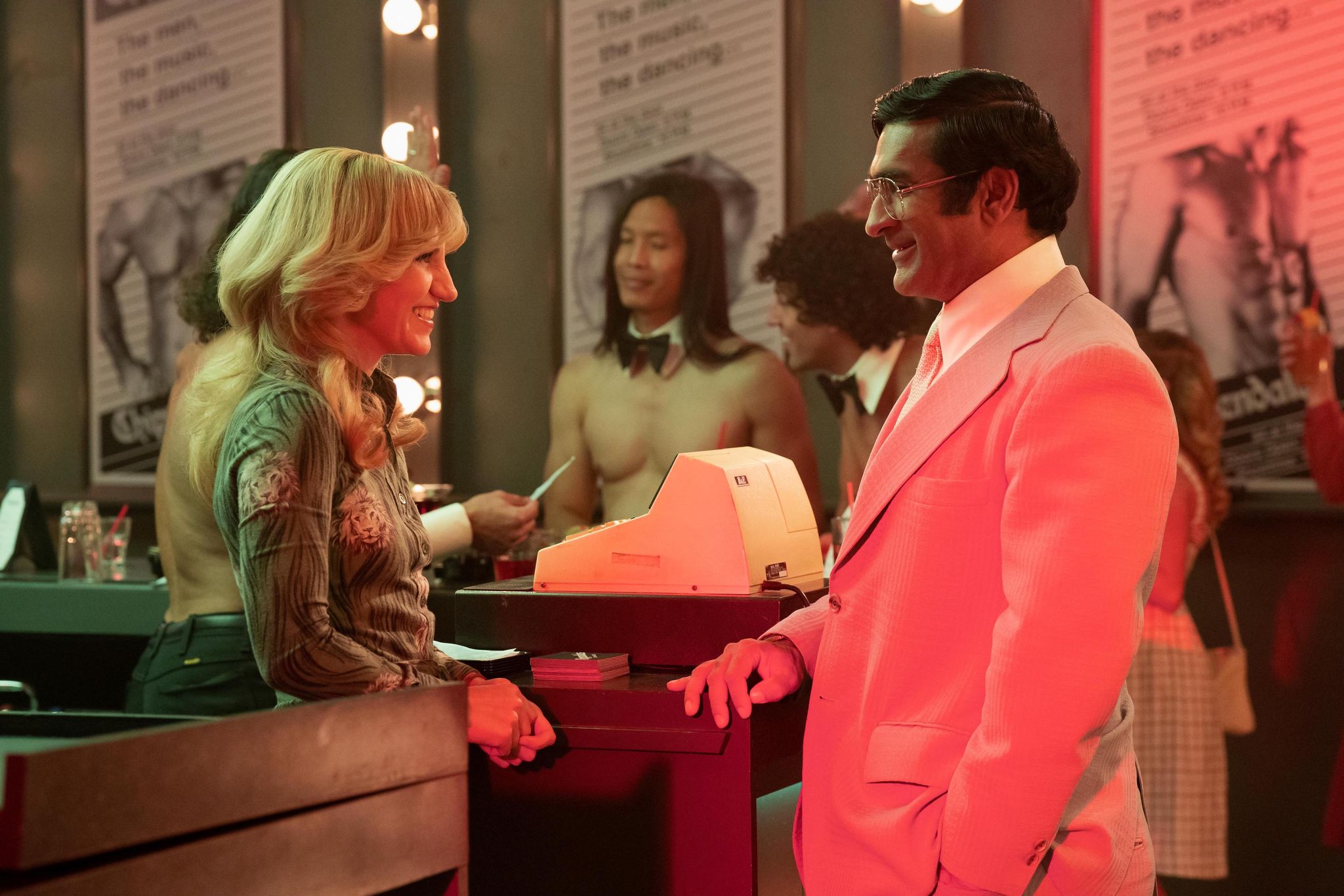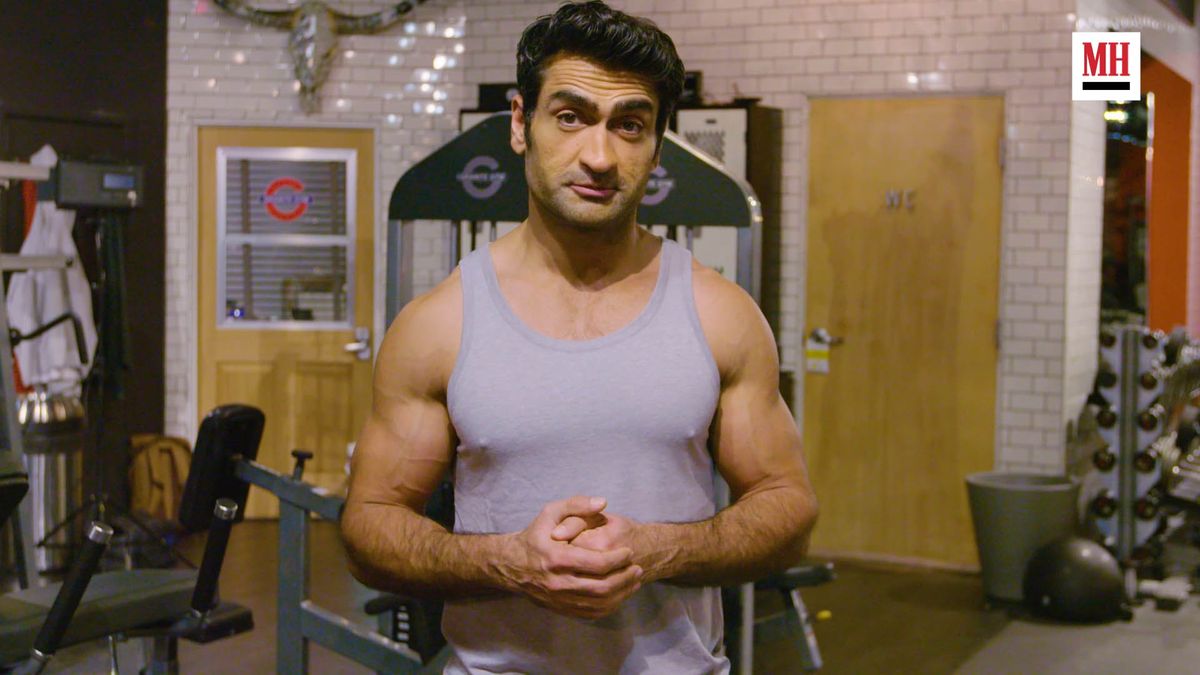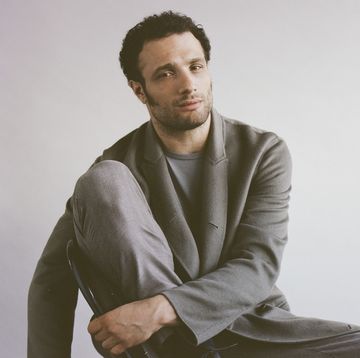Some stories only need to be told once. Others, so salacious and scarcely believable, are stuck on repeat. The sweaty, bloody history of male-stripping empire Chippendales appears to be the latter. There have been podcasts, documentaries and now, a shiny Disney+ and Hulu TV show, Welcome to Chippendales, starring Kumail Nanjiani as the murderous mastermind behind it all, Steve Banerjee.
“I’ve never gotten to play an arc like this,” Nanjiani says, over Zoom from Los Angeles. “By far the most layered, complex, complicated person I’ve ever played.” “Layered” is the right word for it: after moving from Mumbai to Los Angeles, Banerjee bought a disused nightclub and launched Chippendales in the 1980s. Though the club was popular, Banerjee was endlessly paranoid about rivals and even his own colleagues. His relationship with choreographer Nick De Noia (played in the show by The White Lotus’ Murray Bartlett) was particularly fractious, with ultimately fatal consequences.
It took a good few months to figure Banerjee out; Nanjiani says conversations with his wife, the writer-comedian Emily V. Gordon, and an acting coach, were crucial. As was studying films that evoked a bygone, seedier era: Boogie Nights, Goodfellas, and 1970s Harrison Ford thriller The Conversation. Eventually, Nanjiani performed some armchair psychology. “I think that ultimately, his tragic flaw is that he’s very, very uncomfortable in his own skin,” the 44-year-old actor says. In the eight-part show, Banerjee is constantly wanting others to like him, or his show, or his money. “That’s why the relationship with Irene [Banerjee’s wife, played by Annaleigh Ashford] is important, because the only time he likes himself is when he sees himself through her eyes.”
Nanjiani clearly enjoyed flexing his muscles for the part. Some are well-worn; a comic scene where he first meets his future wife, Irene, is a highlight that makes use of both actors’ deeply watchable comic timing. There’s more dramatic territory, too, such as a tense, 15-page scene opposite hitman Ray (an enjoyably chaotic Robin de Jesús), which takes place in a single hotel room, and was one of Nanjiani’s highlights to film. But none of these modes – comic, romantic, dramatic – are entirely surprising if you’ve been following his career so far.
After moving from Karachi to Iowa to study at university, Nanjiani relocated to Chicago, where he began performing stand-up comedy. Bit parts in political satire Veep followed, though he became a more familiar face as a lead on Silicon Valley, HBO’s sitcom about the tech industry. 2017’s The Big Sick – a rom-com co-written by Nanjiani and Gordon about their own coma-centric meet-cute – put Nanjiani on the map. Eternals, Chloé Zhao’s 2021 Marvel entry in which Nanjaini plays wise-cracking Kingo, edged him into household name territory.
That move into the Marvel Cinematic Universe was accompanied by a superhero glow-up. In the run-up to Eternals, Nanjiani transformed from an Average Joe (though still Hollywood average) into a Marvel hunk. An Instagram post of a jacked-up Nanjiani went viral (and sparked many conversations about male body image). It seems almost cruel that Welcome to Chippendales is full of half-naked beefcakes – the Marvel pin-ups of the 1980s – and Nanjiani plays a pudgy club owner. “I just ate whatever I wanted to because I wanted to look different,” he says about the transformation process. But while that started off great, it quickly spiralled. Soon he was the heaviest he had ever weighed, and he developed sleep apnoea. “I didn’t do it in a healthy way.”
His dedication to the part certainly adds to the look of the show, which is as seedy as it is flashy: you can smell the spilled drinks, the pheromones in the air. But underneath that debaucherous appeal, there’s plenty of darkness. In the first episode, Playboy bunny Dorothy Stratten (played by Nicola Peltz) is killed in a murder-suicide by her estranged husband Paul Snider (Dan Stevens). Uneasy feelings about the endlessly-popular true crime genre linger throughout. At what point does entertainment and education end, and exploitation begin? “What you want to do is not victimise somebody who was already a victim,” Nanjiani says about the Stratten scenes. “You’d want to try and portray them as they were, as best you can.”
Here’s another side of the true crime coin: if Welcome to Chippendales were not based on a true story, Nanjiani believes that the central role would have gone to a white actor. “I think that Hollywood now – even though they’re trying to be more diverse – is still weird,” the actor says. The problem, Nanjiani wagers, is that good intentions can sometimes lead to misguided solutions: if the bad guy is a brown guy, what message is that sending? “And that’s just as limiting as anything else,” he says. “I want to play more bad guys.” Nanjiani would like a career as varied as his Marvel stablemate Sebastian Stan, who can flit from superhero to serial killer (Nanjiani watched Fresh, in which Stan plays a charming, organ-harvesting cannibal). “He does these big Marvel movies, and then he’ll play a psychopath. I was told that’s going to be hard because people don’t want to cast non-white people as bad guys.”
A few days before Nanjiani and I speak in November, Quentin Tarantino became the latest director (following in Martin Scorsese’s footsteps) to decry Marvel's dominance over the film industry. On a podcast, Tarantino lamented how Marvel movies are “the only things that seem to be made” and how superhero characters are now the star attraction rather than the actors who play them. The comments were met with the hysteria that Marvel discourse unfailingly attracts. Nanjiani is a voice of comparable calm: “I obviously love the movies Tarantino makes or Scorsese makes, and I may disagree with Scorsese’s opinion on superhero movies, but I mean, who else has earned the right to have an opinion? If Scorsese hasn’t earned the right to have an opinion on movies, then none of us should have an opinion on movies.” Mostly, he seems a little perplexed. “It’s so strange that people get upset about it.”
What Nanjiani does miss are “the grown-up movies that have a decent budget, decent movie stars in the theatres”. If The Big Sick had been released in 2020 and not 2017, he believes it would not have been released in theatres. “I think our year was the last year where those indie movies found commercial success.” Ladybird, Greta Gerwig’s directorial debut from the same year, would probably have suffered the same fate. “’There’s a sense that people, unless it’s action or horror, don’t want to go to the theatres to see it.” TV, then, is a good space for Nanjiani. The second season of Little America, an anthology series about immigration he co-created with Gordon and Lee Eisenberg, dropped in December.
Nanjiani is a thoughtful and self-aware presence, as analytical about the industry as he is about his own career. After The Big Sick, he received many more opportunities, though they were all in the same realm of a “nerdy, weak guy, defined by his lack of agency or power”. After Eternals, people saw Nanjiani as a more confident, powerful being. He was offered action films after that. His turn as Banerjee will show audiences, once again, a new side. Perhaps Nanjiani’s villain era is within touching distance.
‘Welcome to Chippendales’ is out on Disney+ from 11 January
Henry Wong is a senior culture writer at Esquire, working across digital and print. He covers film, television, books, and art for the magazine, and also writes profiles.















